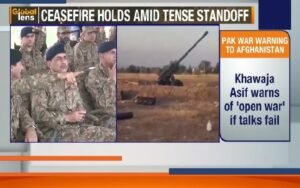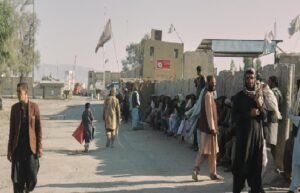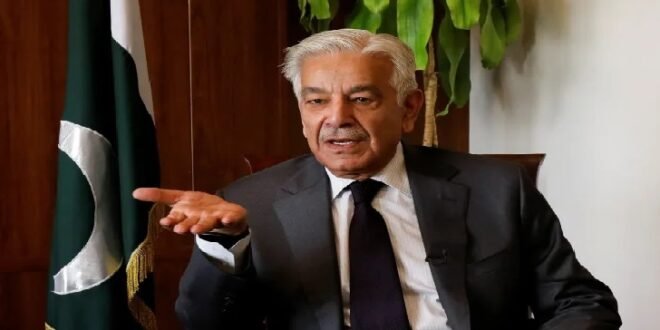27-10-2025
By SJA Jafri + Bureau Report
ISLAMABAD/ DHOHA/ KABUL: Officials from Pakistan and Afghanistan have met in Istanbul for talks on how to ensure a recent ceasefire deal between the two countries holds, with the Pakistani defence minister warning of “open war” should the efforts fail.
 The discussions, which began on Saturday and are expected to continue on Sunday, come just days after a truce was brokered in Doha by Qatar and Turkiye to end deadly clashes between the neighbors. The cross-border violence killed dozens of people and injured hundreds more.
The discussions, which began on Saturday and are expected to continue on Sunday, come just days after a truce was brokered in Doha by Qatar and Turkiye to end deadly clashes between the neighbors. The cross-border violence killed dozens of people and injured hundreds more.
“We have the option, if no agreement takes place, we have an open war with them,” Pakistan Defence Minister Khawaja Muhammad Asif said from the eastern Pakistani city of Sialkot on Saturday “but I saw that they want peace,” he added.
Reporting from Istanbul, journalist Sinem Koseoglu said the “technical-level talks” in Turkiye are expected “to pave the way for a permanent solution between the two neighbors”.
While Afghanistan’s Deputy Interior Minister Haji Najib is leading his country’s delegation in Turkiye, Pakistan has not given details about its representatives.
On Friday, a spokesperson for Pakistan’s Ministry of Foreign Affairs said the negotiations must address “the menace of terrorism emanating from Afghan soil towards Pakistan”.
Pakistan has accused Afghanistan of harboring what it calls “terrorist groups”, including the Pakistani Taliban (TPP). Kabul denies the allegation and has blamed Islamabad for violating its sovereignty through military strikes.
Key crossings between the countries remain shut following the recent fighting, with Afghanistan’s Chamber of Commerce and Industry estimating that traders are losing millions of dollars each day that the closure persists.
 Ibraheem Bahiss, an International Crisis Group analyst in Afghanistan, told media that a key topic of discussion during the Istanbul talks would be intelligence-sharing on armed groups.
Ibraheem Bahiss, an International Crisis Group analyst in Afghanistan, told media that a key topic of discussion during the Istanbul talks would be intelligence-sharing on armed groups.
“For example, Pakistan would give coordinates of where they suspect TTP fighters or commanders are, and instead of carrying out strikes, Afghanistan would be expected to carry out action against them,” he said.
Meanwhile, the ceasefire that was announced in Doha last Sunday continues to hold.
“There has been no major full-scale terrorist attack emanating from Afghan soil in the last two to three days,” Pakistani Foreign Ministry spokesperson Tahir Andrabi said.
“So, the Doha talks and outcome were fruitful. We would like the trend to continue in Istanbul and post-Istanbul.”
The recent downward spiral in Afghanistan-Pakistan relations would have been hard to imagine when Pakistani military and civilian leaders welcomed the Taliban’s return to power in Kabul in August 2021.
A Taliban government, Islamabad believed, would be friendly to Pakistan and would become a bulwark against any security threats to the country. After all, Pakistan’s military and intelligence services had for more than two decades supported the Afghan Taliban movement.
Between 2001 and 2021, this meant a contradictory foreign policy. On the one hand, by supporting the United States’ military intervention in Afghanistan, Pakistan recognized the US-backed governments that ruled the country. At the same time, Pakistan covertly tolerated and even enabled, the resurgence of the Taliban inside Pakistani territory, which also included cohabitation with other Pakistani fighter groups.
 Pressmediaofindia
Pressmediaofindia




